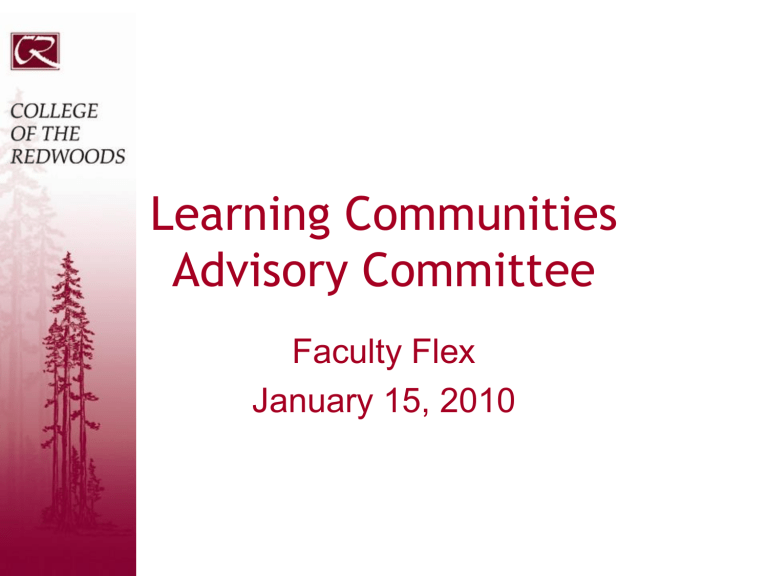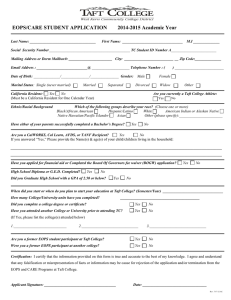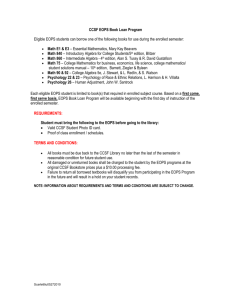Learning Communities Advisory Committee Faculty Flex January 15, 2010

Learning Communities
Advisory Committee
Faculty Flex
January 15, 2010
Agenda
• LCAC Vision
• What is a Learning Community?
• Successful Program Models
• Assessment Systems
• How to get Involved
• Next Steps
• Q & A
Vision
• Learning Communities:
– Support student/faculty/staff interaction
– Help students adjust both academically & socially to college life
– Improve student retention & success
What are Learning
Communities?
1.
Student Cohorts/Integrative Seminar
Programs in which a small cohort of students enrolls in larger classes that faculty do not coordinate. In this model an additional integrative seminar is used to build student connection.
2.
Linked Courses/Course Clusters
Two or more classes linked thematically or by content which a cohort of students takes together. In this model, the faculty do plan the program collaboratively.
3.
Coordinated Study
Coursework that faculty members may team teach.
The course work is embedded in an integrated program of study.
Potential Learning Community
Themes
• Social Change
• Health & Wellness
• Global Awareness
• Environmental Stewardship
• Science & Society
• Visual Arts
• Business Interest
• Communications (interpersonal and global)
• Other ideas?
The Underprepared Report
• Completed in 2003
– Barbara Morrison, English faculty
– Pam Kessler, English faculty
– Sandy Vrem, Math faculty
• Research, Recommendations, and
Road Map for Promoting the
Success of the Underprepared
Students at CR
The Underprepared Report
• Recommendations
– Linked courses
– Integrate counseling/advising into the classroom
– Tutoring component
– First Year Interest Groups (FYI)
• The Write Stuff: FYI with English, journalism, or creative writing.
• Art Beat: FYI for visual & performing arts
• Movers & Shapers: FYI for athletes, health and fitness interests
EOPS Learning Communities
• Established Fall 2007
• Linked English 350 with GS 150 for
EOPS students
• Other EOPS Learning Communities
– English 350, GS 150, CIS 100
– English 150 with Sociology 1
– English 150 with CIS 1
EOPS Learning Community
• Most recent success !
– 80% retention (second highest)
– 75% passed competency exam
– 76% passed the course (highest)
• 93% students were very satisfied with the EOPS LC
• 87% agreed that EOPS LC helped them complete the semester
Successful Programs
• Evergreen State College, Washington
Learning Community National Resource Center http://www.evergreen.edu/washcenter/projec t.asp?pid=73
• El Camino College http://www.elcamino.edu/studentservices/fye
• De Anza Community College http://www.deanza.edu/linc/faculty/overview
.html
Areas to Assess
• Student satisfaction
• Student engagement in learning activities & college community
• Development of skills and knowledge pertinent to course outcomes
• Disciplinary integration
• Advising and counseling component
• Retention, success, and persistence
Assessment Measures
Qualitative and Quantitative
• Student Skills Inventories
• Pre and Post Tests
• Focus Groups
• Surveys
• Exit Interviews
How do I get Involved?
Applications for a
Learning Community Proposal are available at: www.redwoods.edu/learningcommunities
Spring 2010 Next Steps
• Proposal review
• Provide budget needs to appropriate committees
• Create a network of integrated courses & programs
• Discuss compensation options
• Develop student & program learning outcomes
• Establish assessment systems
Questions?
LCAC Membership:
• Keith Snow-Flamer
• Peter Blakemore: Faculty member
• Anita Janis: Dean of Del Norte Campus
• Lisa Liken: Faculty Counselor EOPS
• Melissa Green: Dean of Student Development
• Rachel Anderson: Dean of Academic Affairs
• George Potamianos: Faculty member
• Justine Shaw: Faculty member
• Jennifer Bailey: Coordinator of Advising
• Polly Johns: ASCR
• Cody Anderson: ASCR
• Sheila Hall: Assistant Director of EOPS/CARE

